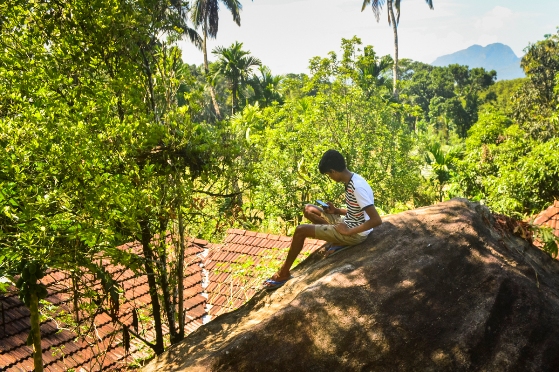Govt. collects Rs 1.4bn from anti-tower tax as rural kids climb roofs for mobile signals
COLOMBO – Sri Lanka has collected Rs 1.4 billion from an urban elitist ‘sustainable’ tax to discourage telecom towers in 2020, official data showed, as rural kids climbed trees and walked on roofs to get signals to participate in online classes amid a COVID-19 pandemic.
Sri Lanka’s ousted ‘Yahapalana’ administration, which came to power promising to simplify the tax system and reduce the total taxes on people and business, slammed a bewildering array of new levies as the taxation machinery was captured by urban elitist interventionists.
Instead of using tax as a revenue source, the interventionists used it to achieve vicarious illiberal ends leveraging the coercive power of the state.
One such was a ‘mobile tower levy’ to discourage new telecom towers and close down towers in cities where the elitist interventionists lived.
The anti-tower tax was in sharp contrast to policies followed by Sri Lanka’s telecom regulator in the 1990s when it led the region.
As urban revenues improved the agency imposed universal service obligations to push telecoms to rural areas where revenue was low.
Later, as licensing was relaxed, the entry of more players boosted competition, and approval of pre-paid connections ratcheted up affordability, many more areas became economically viable through market forces alone.
In 2020, the state had collected Rs 1.43 billion from to anti-tower tax.
In the coronavirus pandemic, Sri Lanka’s television stations carry frequent reports of kids climbing roofs, trees, mountain ridges and rocks to get signals.
When interventionists try to change people’s behaviours to suit their own vicarious desires, using compulsion, coercion, and the threat of fines and jails, unintended outcomes are the result.
To counter the un-intended fallout several more interventions are needed.
In another classic state interventionism, the current administration has given a tax holiday for people who put up mobile towers, in a ‘carrot’ rather than a ‘stick’ interventionism adding economic nationalism into the mix, even as the anti-tower tax revenues went up by 40%.
“Five-year tax exemption period for any undertaking commenced on or after January 1, 2021 by any resident who constructs and installs the communication towers and related appliances using local labours and local raw materials in Sri Lanka or provide required technical services for such construction or installation,” according to the finance ministry.
Sri Lanka’s urban elitists who are grappling with obesity also imposed a sugar tax, making it more expensive to poor rural kids to buy items such as ginger beer as their forefathers had done before them.
The urban elitist sugar tax forced people to consume chemical cocktails instead of natural sugar.
The urban elitists in the last administration also slammed a carbon tax on cars, despite petrol, in particular, being heavily taxed, based on the age of cars.
Old cars are usually used by the poor, and pensioners and are not much on the road, unlike new cars used by millionaires.
The central bank also injected liquidity intervening in interest rate markets for ‘stimulus’, slapped price ceilings on deposits of old people and busted the rupee from 131 to 182 triggering two currency crises.
The administration was roundly defeated in 2019. However ‘stimulus’ was ratcheted up and Sri Lanka is now firefighting the balance of payments.
-economynext.com


